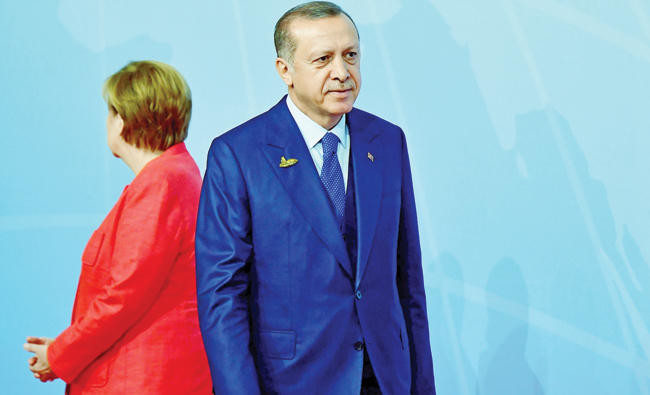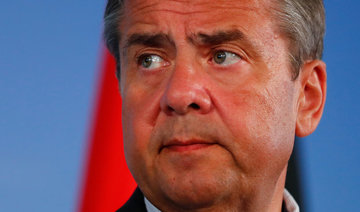ANKARA: Ahead of Germany’s general election on Sept. 24, the war of words between Ankara and Berlin is escalating.
On Friday, Turkish President Recep Tayyip Erdogan described Germany’s ruling Christian Democrats and Social Democrats, as well as the Green Party, as “enemies of Turkey.”
Erdogan urged Germany’s 1 million ethnic Turks who will vote to reject these parties. “This is a struggle of honor for all my citizens living in Germany. They should be taught a lesson,” he said.
The call was criticized by Germany’s ruling politicians. Foreign Minister Sigmar Gabriel said the “unprecedented” call undermined German sovereignty.
Erdogan hit back on Aug. 19, when he said Gabriel must “know his limits.” Erdogan said: “He is trying to teach us a lesson. What is your background in politics? How old are you?”
Chancellor Angela Merkel, who criticized Turkey days ago for jailing dissident journalists and activists, reacted via a Twitter statement by her chief spokesman Steffen Seibert: “On President Erdogan’s recent statements: We expect foreign governments not to intervene in our internal affairs.”
Merkel committed to prevent the launch of customs union modernization negotiations with Turkey.
Germany recently withdrew its troops from a military base in southern Turkey and relocated them to Jordan, after Ankara refused to permit German lawmakers to visit the forces there.
The major trade partners and NATO members have been at odds since Berlin refused to allow Turkish politicians to campaign in Germany for Turkey’s constitutional referendum in April.
In reaction, Turkey’s ruling AK Party (AKP) accused Germany of employing “Nazi practices.”
There are 10 Germans, either journalists or activists, in detention in Turkey — another point of contention.
Talip Kucukcan, head of the Parliamentary Assembly of the Council of Europe and an AKP lawmaker, said Turkish-German relations have a long and deep-rooted history.
“I believe that rationality and realism will shape the future of relations between Turkey and Germany,” he told Arab News.
“The volume of economic relations, the presence of a large Turkish diaspora, and strategic partnership over migration and security will come to the fore and drive Turkish-German relations.”
The worst scenario, Kucukcan said, is pressure by Berlin on German companies operating in Turkey to limit their investments.
“But this might backfire due to global competition for Turkish markets, so I believe that the leaders of Turkey and Germany won’t allow a lose-lose policy,” he said, adding that the business world and the Turkish diaspora may play a constructive mediation role.
Kucukcan said Ankara will never accept Germany as a partner as long as it is a safe haven for members of terrorist organizations such as the Kurdistan Workers’ Party (PKK) and the Gulen movement, which is believed to have been behind last year’s failed coup attempt in Turkey.
Ozgur Unluhisarcikli, Ankara office director at the German Marshall Fund of the US, said both countries have grievances and think the other side will back down, but both may be wrong.
“Germany is apparently inspired by Russia’s success in changing Turkey’s policy in Syria through economic pressure, and thinks that economic pressure is the only language the Turkish government understands,” Unluhisarcikli told Arab News.
Germany is Turkey’s largest economic and trade partner, and has significant investments in Turkey with about 7,000 German companies.
The crisis has reduced the number of German tourists in Turkey, traditionally among the largest groups of visitors.
Ankara sees Berlin’s stance “as a tactic against the populist right during the upcoming parliamentary election, and wishfully thinks Merkel will soften her position after the election,” Unluhisarcikli said.
But while both Turkey and Germany stand to lose from the crisis, they can afford to maintain their positions for much longer than either anticipates, he added.
“Turkey changed its policy toward Syria not only because of Russian economic pressure, but also because the policy was no longer in sync with the reality on the ground, so it’s not true that Ankara will back down every time it faces economic pressure,” said Unluhisarcikli.
“Merkel’s position reflects a growing dislike of the Turkish government among Germans and throughout Europe, which isn’t expected to change after the elections in Germany.”
Unluhisarcikli said all grievances on both sides can be addressed, and what is needed is increased diplomacy and fewer public statements by German and Turkish politicians.


German-Turkish war of words escalates
German-Turkish war of words escalates

Syrian leader to meet Putin, Russia seeks deal on military bases

MOSCOW: Syrian President Ahmed Al-Sharaa will meet Russian counterpart Vladimir Putin in Moscow on Wednesday, as the Kremlin seeks to secure the future of its military bases in the country.
Putin and Sharaa struck a conciliatory tone at their previous meeting in October, their first since Sharaa’s rebel forces toppled Moscow-ally Bashar Assad in 2024.
But Russia’s continued sheltering of Assad and his wife since their ouster remains a thorny issue. Sharaa has repeatedly pushed Russia for their extradition.
Sharaa, meanwhile, has embraced US President Donald Trump, who on Tuesday praised the Syrian leader as “highly respected” and said things were “working out very well.”
Putin, whose influence in the Middle East has waned since Assad’s ouster, is seeking to maintain Russia’s military footprint in the region.
Russia withdrew its forces from the Qamishli airport in Kurdish-held northeast Syria earlier this week, leaving it with only the Hmeimim air base and Tartus naval base on Syria’s Mediterranean coast — its only military outposts outside the former Soviet Union.
“A discussion is planned on the status of bilateral relations and prospects for developing them in various fields, as well as the current situation in the Middle East,” the Kremlin said of the upcoming meeting in a statement on Tuesday.
Russia was a key ally of Assad during the bloody 14-year Syrian civil war, launching air strikes on rebel-held areas of Syria controlled by Sharaa’s Islamist forces.
The toppling of Assad dealt a major blow to Russia’s influence in the region and laid bare the limits of Moscow’s military reach amid the Ukraine war.
The United States, which cheered Assad’s demise, has fostered ever-warmer ties with Sharaa — even as Damascus launched a recent offensive against Kurdish forces long backed by the West.
Despite Trump’s public praise, both the United States and Europe have expressed concern that the offensive in Syria’s northeast could precipitate the return of Islamic State forces held in Kurdish-held jails.
Putin and Sharaa struck a conciliatory tone at their previous meeting in October, their first since Sharaa’s rebel forces toppled Moscow-ally Bashar Assad in 2024.
But Russia’s continued sheltering of Assad and his wife since their ouster remains a thorny issue. Sharaa has repeatedly pushed Russia for their extradition.
Sharaa, meanwhile, has embraced US President Donald Trump, who on Tuesday praised the Syrian leader as “highly respected” and said things were “working out very well.”
Putin, whose influence in the Middle East has waned since Assad’s ouster, is seeking to maintain Russia’s military footprint in the region.
Russia withdrew its forces from the Qamishli airport in Kurdish-held northeast Syria earlier this week, leaving it with only the Hmeimim air base and Tartus naval base on Syria’s Mediterranean coast — its only military outposts outside the former Soviet Union.
“A discussion is planned on the status of bilateral relations and prospects for developing them in various fields, as well as the current situation in the Middle East,” the Kremlin said of the upcoming meeting in a statement on Tuesday.
Russia was a key ally of Assad during the bloody 14-year Syrian civil war, launching air strikes on rebel-held areas of Syria controlled by Sharaa’s Islamist forces.
The toppling of Assad dealt a major blow to Russia’s influence in the region and laid bare the limits of Moscow’s military reach amid the Ukraine war.
The United States, which cheered Assad’s demise, has fostered ever-warmer ties with Sharaa — even as Damascus launched a recent offensive against Kurdish forces long backed by the West.
Despite Trump’s public praise, both the United States and Europe have expressed concern that the offensive in Syria’s northeast could precipitate the return of Islamic State forces held in Kurdish-held jails.
© 2026 SAUDI RESEARCH & PUBLISHING COMPANY, All Rights Reserved And subject to Terms of Use Agreement.












